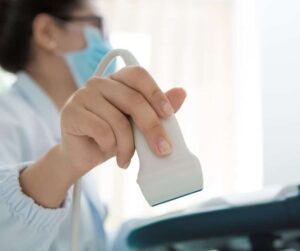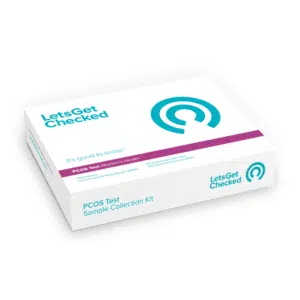Research shows that it can take up to 2 years and at least 3 doctors visits to be diagnosed with PCOS (1). This is pretty surprising given that PCOS is the most common hormonal disorder affecting women of reproductive age.
Now, if you’re struggling with some of the common symptoms of polycystic ovary syndrome like irregular periods, excess hair growth, or fertility issues, 2 years to get answers is a really long time to have to wait!
Surely there must be an easier way to get a PCOS diagnosis! Well, thankfully, there is.
The new PCOS Home Test from Let’s Get Checked is one of the only at-home tests that can give you a probable PCOS diagnosis with a simple finger prick, from the comfort of your own home.
Before I tell you how it all works, we need to understand how PCOS is typically diagnosed.
 There’s no one definitive test for polycystic ovary syndrome. In fact, most doctors will use a combination of symptoms, medical history, and physical exam to make a diagnosis.
The most common way to diagnose PCOS is by using the Rotterdam criteria. To meet the Rotterdam criteria, you must have at least 2 of the 3 following conditions:
1. Irregular menstrual cycles – this means having fewer than 8 periods in a year, or no period for 4 months or longer
2. Excess androgen (male hormones) levels – this can present as excess hair growth on the face, chest, back, or buttocks (hirsutism), or thinning hair on the scalp
3. Polycystic ovaries – this is when the ovaries become enlarged and contain small collections of fluid (follicles) around the eggs they contain
If you have any of the following, it’s likely that your doctor will also want to rule them out as potential causes of your symptoms before making a diagnosis of polycystic ovary syndrome:
1. Cushing’s syndrome
2. Congenital adrenal hyperplasia
3. Androgen-secreting tumors
4. Hypothyroidism
5. Hyperprolactinemia
6. Drug-induced hirsutism
Some of the tests your doctor may do include:
There’s no one definitive test for polycystic ovary syndrome. In fact, most doctors will use a combination of symptoms, medical history, and physical exam to make a diagnosis.
The most common way to diagnose PCOS is by using the Rotterdam criteria. To meet the Rotterdam criteria, you must have at least 2 of the 3 following conditions:
1. Irregular menstrual cycles – this means having fewer than 8 periods in a year, or no period for 4 months or longer
2. Excess androgen (male hormones) levels – this can present as excess hair growth on the face, chest, back, or buttocks (hirsutism), or thinning hair on the scalp
3. Polycystic ovaries – this is when the ovaries become enlarged and contain small collections of fluid (follicles) around the eggs they contain
If you have any of the following, it’s likely that your doctor will also want to rule them out as potential causes of your symptoms before making a diagnosis of polycystic ovary syndrome:
1. Cushing’s syndrome
2. Congenital adrenal hyperplasia
3. Androgen-secreting tumors
4. Hypothyroidism
5. Hyperprolactinemia
6. Drug-induced hirsutism
Some of the tests your doctor may do include:
 One of the most common tests for PCOS is a transvaginal ultrasound. This involves using a wand-like device (transducer) to emit sound waves from outside the body. The sound waves create pictures of your ovaries and fallopian tubes on a monitor.
Your doctor may do this to:
1. Check for polycystic ovaries
2. Exclude other medical conditions that can cause similar symptoms, such as ovarian tumors
It is important to note that it is possible to have polycystic ovaries without having PCOS. In fact, up to 20% of women have polycystic ovaries but do not meet the criteria for PCOS.
One of the most common tests for PCOS is a transvaginal ultrasound. This involves using a wand-like device (transducer) to emit sound waves from outside the body. The sound waves create pictures of your ovaries and fallopian tubes on a monitor.
Your doctor may do this to:
1. Check for polycystic ovaries
2. Exclude other medical conditions that can cause similar symptoms, such as ovarian tumors
It is important to note that it is possible to have polycystic ovaries without having PCOS. In fact, up to 20% of women have polycystic ovaries but do not meet the criteria for PCOS.
 The polycystic ovary syndrome home test is a simple finger prick test that can be done in the comfort of your own home. All you need is a small sample of blood, which you collect by pricking your finger with the provided lancet.
Once you have your blood sample, you simply mail it back to the Let’s Get Checked laboratory in the provided pre-paid envelope.
Your sample will then be tested for the following key hormones:
The polycystic ovary syndrome home test is a simple finger prick test that can be done in the comfort of your own home. All you need is a small sample of blood, which you collect by pricking your finger with the provided lancet.
Once you have your blood sample, you simply mail it back to the Let’s Get Checked laboratory in the provided pre-paid envelope.
Your sample will then be tested for the following key hormones:
 The birth control pill can impact on levels of reproductive hormones that can skew the test results. So, with that in mind, it is not recommended to do the Let’s Get Checked PCOS test whilst you are taking birth control.
The birth control pill can impact on levels of reproductive hormones that can skew the test results. So, with that in mind, it is not recommended to do the Let’s Get Checked PCOS test whilst you are taking birth control.
 The tests are done by the same labs commonly used by most healthcare facilities. They are frequently monitored and undergo regular quality control. In addition, every test is reviewed by our team of clinical experts before a probable diagnosis is given.
The tests are done by the same labs commonly used by most healthcare facilities. They are frequently monitored and undergo regular quality control. In addition, every test is reviewed by our team of clinical experts before a probable diagnosis is given.
References:
1Gibson-Helm, M., & Teede, H. (2017). Delayed Diagnosis and a Lack of Information Associated With Dissatisfaction in Women With Polycystic Ovary Syndrome – PubMed. pubmed.ncbi.nlm.nih.gov
How is PCOS Diagnosed?
 There’s no one definitive test for polycystic ovary syndrome. In fact, most doctors will use a combination of symptoms, medical history, and physical exam to make a diagnosis.
The most common way to diagnose PCOS is by using the Rotterdam criteria. To meet the Rotterdam criteria, you must have at least 2 of the 3 following conditions:
1. Irregular menstrual cycles – this means having fewer than 8 periods in a year, or no period for 4 months or longer
2. Excess androgen (male hormones) levels – this can present as excess hair growth on the face, chest, back, or buttocks (hirsutism), or thinning hair on the scalp
3. Polycystic ovaries – this is when the ovaries become enlarged and contain small collections of fluid (follicles) around the eggs they contain
If you have any of the following, it’s likely that your doctor will also want to rule them out as potential causes of your symptoms before making a diagnosis of polycystic ovary syndrome:
1. Cushing’s syndrome
2. Congenital adrenal hyperplasia
3. Androgen-secreting tumors
4. Hypothyroidism
5. Hyperprolactinemia
6. Drug-induced hirsutism
Some of the tests your doctor may do include:
There’s no one definitive test for polycystic ovary syndrome. In fact, most doctors will use a combination of symptoms, medical history, and physical exam to make a diagnosis.
The most common way to diagnose PCOS is by using the Rotterdam criteria. To meet the Rotterdam criteria, you must have at least 2 of the 3 following conditions:
1. Irregular menstrual cycles – this means having fewer than 8 periods in a year, or no period for 4 months or longer
2. Excess androgen (male hormones) levels – this can present as excess hair growth on the face, chest, back, or buttocks (hirsutism), or thinning hair on the scalp
3. Polycystic ovaries – this is when the ovaries become enlarged and contain small collections of fluid (follicles) around the eggs they contain
If you have any of the following, it’s likely that your doctor will also want to rule them out as potential causes of your symptoms before making a diagnosis of polycystic ovary syndrome:
1. Cushing’s syndrome
2. Congenital adrenal hyperplasia
3. Androgen-secreting tumors
4. Hypothyroidism
5. Hyperprolactinemia
6. Drug-induced hirsutism
Some of the tests your doctor may do include:
An Ultrasound to Diagnose PCOS
 One of the most common tests for PCOS is a transvaginal ultrasound. This involves using a wand-like device (transducer) to emit sound waves from outside the body. The sound waves create pictures of your ovaries and fallopian tubes on a monitor.
Your doctor may do this to:
1. Check for polycystic ovaries
2. Exclude other medical conditions that can cause similar symptoms, such as ovarian tumors
It is important to note that it is possible to have polycystic ovaries without having PCOS. In fact, up to 20% of women have polycystic ovaries but do not meet the criteria for PCOS.
One of the most common tests for PCOS is a transvaginal ultrasound. This involves using a wand-like device (transducer) to emit sound waves from outside the body. The sound waves create pictures of your ovaries and fallopian tubes on a monitor.
Your doctor may do this to:
1. Check for polycystic ovaries
2. Exclude other medical conditions that can cause similar symptoms, such as ovarian tumors
It is important to note that it is possible to have polycystic ovaries without having PCOS. In fact, up to 20% of women have polycystic ovaries but do not meet the criteria for PCOS.
Blood Test to Diagnose PCOS
Another common way to diagnose PCOS is through blood tests. These can help assess your hormone levels and rule out other conditions that might be causing your symptoms. Some of the blood tests your doctor may do include:- Testosterone
- Sex Hormone Binding Globulin (SHBG)
- Free Androgen Index (FAI)
- Follicle-Stimulating Hormone (FSH)
- Luteinizing Hormone (LH)
- Cortisol levels
How the PCOS Home Test Works
 The polycystic ovary syndrome home test is a simple finger prick test that can be done in the comfort of your own home. All you need is a small sample of blood, which you collect by pricking your finger with the provided lancet.
Once you have your blood sample, you simply mail it back to the Let’s Get Checked laboratory in the provided pre-paid envelope.
Your sample will then be tested for the following key hormones:
The polycystic ovary syndrome home test is a simple finger prick test that can be done in the comfort of your own home. All you need is a small sample of blood, which you collect by pricking your finger with the provided lancet.
Once you have your blood sample, you simply mail it back to the Let’s Get Checked laboratory in the provided pre-paid envelope.
Your sample will then be tested for the following key hormones:
- Testosterone and androgen levels
- Sex Hormone Binding Globulin (SHBG)
- Free Androgen Index (FAI)
- Follicle-Stimulating Hormone (FSH)
- Luteinizing Hormone (LH)
- Cortisol levels
How do I Collect my Let’s Get Checked Samples?
As the tests look for hormones that fluctuate throughout your cycle, it is important to time your tests correctly. If you have a regular menstrual cycle, you should take the test on days 3, 4, and 5 of your menstrual cycle. This should be 3-5 days after you have started your period.What happens if I don’t have a regular cycle?
If you have irregular periods, as is one of the main PCOS symptoms, you need to do the tests on any 3 consecutive days, from Monday to Friday. The team at Let’s Get Checked will understand your lack of a cycle and will use this information when interpreting your results.Can you do the PCOS Home Test if you are on Hormonal Birth Control?
 The birth control pill can impact on levels of reproductive hormones that can skew the test results. So, with that in mind, it is not recommended to do the Let’s Get Checked PCOS test whilst you are taking birth control.
The birth control pill can impact on levels of reproductive hormones that can skew the test results. So, with that in mind, it is not recommended to do the Let’s Get Checked PCOS test whilst you are taking birth control.
What Happens if My Blood Tests Show I may have PCOS?
If your tests come back abnormal and suggest that you may have PCOS, one of the Let’s Get Checked clinical experts and nursing team will be in touch to advise you with regard to what the next steps may be, which medical experts to see and whether other tests may be required. If you are trying to conceive, a reproductive endocrinologist may well be recommended.Why is it Important to Confirm if you have Polycystic Ovary Syndrome?
We know that women with PCOS have a lot of very unpleasant symptoms, from excessive hair growth to irregular menstrual cycles and weight gain. Research also shows that there is a big psychological impact and impact to the overall health of a woman with PCOS. Also, the hormone imbalance associated with polycystic ovarian syndrome can have other affects. Women with PCOS are at increased risk of developing other health conditions such as:- high blood pressure
- insulin resistance
- heart disease
- high cholesterol
- and even sleep apnea
How Accurate is the the Let’s Get Checked Home Test?
 The tests are done by the same labs commonly used by most healthcare facilities. They are frequently monitored and undergo regular quality control. In addition, every test is reviewed by our team of clinical experts before a probable diagnosis is given.
The tests are done by the same labs commonly used by most healthcare facilities. They are frequently monitored and undergo regular quality control. In addition, every test is reviewed by our team of clinical experts before a probable diagnosis is given.
How much Does the Let’s Get Checked PCOS Test Cost?
The Let’s Get Checked PCOS Test normally costs $119, with free shipping. However, as I believe so much in this product, I have partnered with Let’s Get Checked and they are offering all PCOS Diet Support readers and 30% discount on the test kit. To check out Let’s Get Checked or to get the discount, go here: Let’s Get Checked US Let’s Get Checked UKSumming it Up:
Women with PCOS can have a pretty rough time dealing with the symptoms from day to day. There is so much confusion around PCOS and very often women feel that they do not get the support that they really need to manage the symptoms. Also, waiting over 2 years for a diagnosis is simply unthinkable! We need better ways of being diagnosed and streamlining the process. The PCOS Test from Let’s Get Checked could be the first step in the process and may help to answer a lot of your nagging questions. The results of the home hormone test will give your doctor invaluable insight and evidence that further tests are warranted.What was your PCOS Diagnosis Like?
I would love to hear from you! How long did it take and how many doctors did you have to see before you were diagnosed with PCOS? Leave me a comment below and let me know…Join the PCOS Weight Loss Program:
- sustainable pcos weight loss strategies
- Over 5500 women have done it and seen results
- [bonus] combat cravings kit
- [bonus] intermittent fasting for pcos course
- [BONUS] personalised nutrition plan
JOIN OVER 5,500 OTHERS







